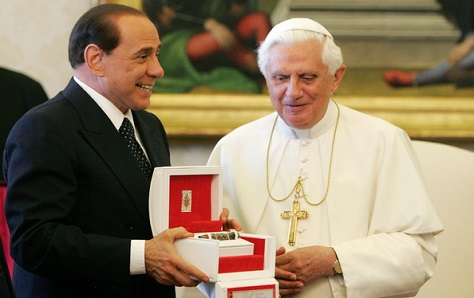
Days after Pope Francis left a historic visit to the United States, news emerged that he spent part of his time at an unannounced meeting with Kim Davis, the Kentucky county clerk waging a fight to withhold marriage licenses to same-sex couples on religious grounds.![]()
![]()
![]()
As The New York Times reported earlier this morning, Francis met with the Kentucky woman last Thursday at the Vatican embassy in Washington, D.C.:
On Tuesday night, her lawyer, Mathew D. Staver, said in a telephone interview that Ms. Davis and her husband, Joe, were sneaked into the Vatican Embassy by car on Thursday afternoon. Francis gave her rosaries and told her to “stay strong,” the lawyer said. The couple met for about 15 minutes with the pope, who was accompanied by security guards, aides and photographers. Mr. Staver said he expected to receive photographs of the meeting from the Vatican soon. On Wednesday, the Vatican spokesman, the Rev. Federico Lombardi, confirmed that the meeting took place, but he declined to elaborate. “I do not deny that the meeting took place, but I have no other comments to add,” he said.
Noah Feldman, a professor of constitutional and international law at Harvard University, argues that the meeting undermines the rule of law:
When Francis met with Davis — who let it be noted is an evangelical Protestant, although her parents apparently are Catholic — he was sending the wrong message, namely that there’s something sympathetic or even legitimate about public official refusing to do his or her job when religious teaching goes the other way.
Running for president, John F. Kennedy had to overcome the Protestant allegation that as a Catholic he would obey the pope and not the laws and Constitution of the U.S. In a famous speech, Kennedy made it clear that he wouldn’t take instructions from Rome. And he said he would be a president “whose fulfillment of his presidential oath is not limited or conditioned by any religious oath, ritual or obligation.” That’s exactly what’s required of all public officials. And no one should undercut it, pope or otherwise.
For better or worse, the Vatican City is a state (albeit a very small one), and both the Vatican City, a traditional jurisdictional-based sovereign, and the Holy See, the universal ecclesiastical government of the Catholic Church have their own versions of the ‘national interest.’ That is, the Vatican and the Holy See both work to perpetuate their global power and influence, chiefly by maintaining and growing the base of 1.2 billion Catholic believers worldwide.
So it should come as no surprise that any pope, Francis or otherwise, would seek to empower the religious influence of Christians, including Protestants like Davis, even if it means trashing the rule of law. It’s no shock to learn that the Catholic Church has often joined the side of illiberalism in history.
The Vatican City came into existence on in 1929 as a sovereign entity when Italy’s Fascist leader at the time, Benito Mussolini, signed the Lateran Treaty with the Holy See, settling a long-running question that followed Italy’s unification in the 1860s. The support that the Catholic Church provided to Italy’s Fascist government is well-documented. Moreover, the Church played an important postwar role in bolstering the essentially one-party rule of Democrazia Cristiana (DC, Christian Democracy), making the Church all too often bedfellows with the Sicilian Mafia and other uncomfortable backers of the Christian Democrats.
As recently as 2008, the Vatican helped pressure senators in Italy’s parliament to bring down the elected government of center-left prime minister Romano Prodi because it fiercely opposed Prodi’s effort to introduce same-sex civil unions. Prodi, it’s true, pushed ahead with the vote despite warnings from many politicians that it would cause his government to collapse. The Church, for what it’s worth, did not force anyone in Italy to vote for Silvio Berlusconi in the resulting election, who won and would serve as prime minister until 2011. But it’s impossible to avoid the uncomfortable conclusion that the Vatican played a significant role in Prodi’s fall. Moreover, Italy today remains one of the only western European countries that lacks marriage equality. That’s almost entirely due to the Vatican’s influence.
Throughout most of the world, the Vatican’s power is limited to ‘soft power’ — that is, the authority that it commands as an arbiter of moral and ethical standards for 1.2 billion Catholics and, likely, throughout all of Christendom. Sometimes, a pope’s influence is political, like John Paul II’s particular experience and anti-Communist credentials as a Polish national serving at the height of the Cold War. Francis, the first Latin American pope, has a particular hold in South America, especially in Brazil and his native Argentina, that mixes religious belief with national pride.
But in Italy, the Vatican actually has quite a bit of ‘hard power’ — according to a recent article in The New Yorker, the Church owns around 20% of all real estate in Italy and 25% of the property in Rome, Italy’s capital and home to the Vatican City itself: Continue reading Don’t be surprised by papal meeting with Kim Davis